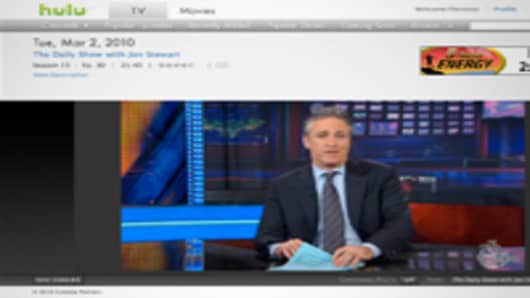“We tried to reach a deal. We got close. We continued to talk even over the weekend. But we could not agree on a price,” said a person involved in the Viacom negotiations who requested anonymity because the process was conducted in private.
The three-year-old Hulu dominates the mushrooming market for online full-episode TV viewing, with more than 44 million monthly visitors, according to comScore, the online measurement firm. The site’s monthly video view totals have surged in recent months, from 580 million last September to 1.01 billion last December. But Hulu is unprofitable, according to analysts. The site’s advertising sales staff has struggled at times to keep pace with the torrid growth, and a partial pay model has been discussed by its owners, which include three of the broadcast networks, ABC, NBC and Fox.
Laura Martin, an analyst at Needham & Company who has criticized the Hulu business model, said “the content companies continue to experiment with how to monetize their premium content on digital platforms. Hulu is a failed experiment for Viacom.”
The severing of ties with Hulu does not represent a strategic shift for Viacom. Comedy Central will continue to stream full episodes of the news satires on TheDailyShow.com and ColbertNation.com. In a good-neighbor role, Hulu will direct users to those sites.
Still, the decision immediately angered online fans who prefer Hulu. Others said they would wind up watching fewer episodes of “The Daily Show” as a result.
Comedy Central’s initial agreement with Hulu, in mid-2008, was notable at the time because cable channels had moved their shows onto the Web more slowly than broadcasters. The deal placed “The Daily Show,” “The Colbert Report” and a selection of other shows on the service.
“In the past 21 months, we’ve had very strong results for both Hulu and Comedy Central, in terms of the views and revenue we’ve generated,” Andy Forssell, senior vice president for content and distribution at Hulu, wrote in a blog post Tuesday evening. Mr. Forssell said that Hulu’s viewers had been “extremely vocal and passionate” about “The Daily Show” and “The Colbert Report.”
In a message that seemed written specifically for Comedy Central, he said that Hulu had “driven steadily increasing revenue per view” for the shows “as advertisers voted with their budgets to take advantage of innovative ad formats and very strong advertising effectiveness.”
But he said the two companies could not come to a new agreement. Television episodes and individual films regularly rotate on and off Hulu, in accordance with the site’s agreements with the content providers. The site prizes transparency: it explains the limits placed on each show, and episodes and clips are marked with icons that indicate their expiration dates. But the removal of entire series is highly unusual, especially ones as popular as “The Daily Show” and “The Colbert Report.”
Hulu users who have added “The Daily Show” and “The Colbert Report” to their queue will be informed of their removal later this week, a spokeswoman said. The removal will take effect late next Tuesday, March 9.
Hulu said it was still talking to Comedy Central about “a number of opportunities.” A Comedy Central spokesman declined to say whether the channel would strike a distribution deal with one of Hulu’s competitors.
The channel said in a statement that “we had a great experience with Hulu, and we hope to work with its team again in the future.”
The companies declined to say what prices were discussed. Hulu’s deals with content owners revolve around an advertising revenue split; the owners typically receive 50 to 70 percent of the revenue, and Hulu keeps the rest, according to industry executives. Because “The Daily Show” and “Colbert” are so popular on the service, Viacom may have insisted on an upfront payment as well, although representatives for the companies would not confirm this.
“There have certainly been instances where there was a premium paid for what you might call the ‘halo effect,’ ” the person involved in the negotiations said. In this case, the “halo effect” would be the users who come to Hulu for Mr. Stewart’s jokes and stay to watch other shows.
Ben Elowitz, the chief executive of Wetpaint, which manages fan Web sites for shows like “The Bachelor” and “Glee,” said the split “looks like a game of chicken being played on their negotiation.”
Hulu, he said, is vulnerable: “Their concept of being the ultimate destination for TV shows only works if they can get the content — and the media companies will never let the balance of power over their content shift to a third party.”


